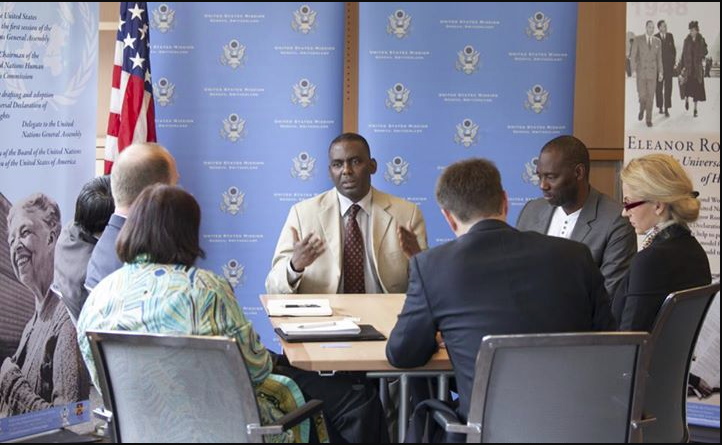July 16, 2015 Cazzie Reyes Opinion
Robots and Trafficking
The show Humans depicts robots as domestic helpers, crop harvesters and sex workers and poses ethical questions revolving around inhumane treatment and exploitation.
A descendant of slaves himself, Biram Dah Abeid began to formally fight slavery and discrimination in Mauritania through an organization he formed at age 19: the National African Movement. He openly addressed the Secretary of State at the time, Colonel Mohamed Khouna Ould Haïdalla, about the poor conditions of black Mauritanians. In 1993, Abeid remained engaged in the political realm by running as an independent candidate for the municipal elections in Nouadhibou. However, political turmoil in 1996 led him to step away from politics, and he went back to school to obtain a Masters in History. Years later, Abeid returned to the forefront of the antislavery movement.

In 2002, Abeid did research for SOS Esclaves (SOS Slaves) and became its formal member in 2005. Abeid founded Initiative pour la Résurgence du mouvement Abolitionniste (Initiative for the Resurgence of the Abolitionist Movement or IRA-Mauritania) and in 2007, worked with Zeine Ould Zeïdane, a former presidential candidate, to advocate for the abolition of slavery and to fight against discrimination. IRA-Mauritania was instrumental to the passage of a new piece of legislation in Mauritania that required victims to press charges against their alleged enslavers. To this day, Abeid and his organization try to hold the courts accountable and put pressure on them to put slave owners on trial.
Abeid’s active role in the fight against slavery has exposed him to denunciation and threats. In 2010, he was stripped of his position as Senior Adviser to the President of the National Commission for Human Rights for unceasingly voicing Mauritania’s slavery issues. That same year he was arrested, detained and tortured after protesting against the enslavement of a young girl.
In January 2011, Abeid and two other activists were imprisoned for allegedly assaulting police officers during a demonstration. Months later, in August 2011, Abeid and 10 IRA activists were injured by Mauritanian police after sitting-in in front of the police brigade to protest against the employment of minors.
On April 29, 2012, police arrested Abeid for publicly burning Islamic law books that he said justified the practice of slavery. Law enforcement charged him for threatening national security and good morals, managing a non-authorized organization and for apostasy. The courts sentenced him with the death penalty. Following pressure from the European Union, Abeid was released on bail on September 3, 2012, but the death sentence is still pending.
In January 2013, Abeid and IRA-Mauritania hosted “Caravane de la Liberté” to inform the slave community about their rights and to create a platform for freed slaves to share their experiences and stories. At that time, IRA-Mauritania spoke to local authorities and emphasized the importance of applying existing antislavery legislation.
Abeid’s determination to enforce laws against slavery paid off when officials prosecuted and sentenced a slave-master, Ahmed Ould Hassine, to prison. Abeid continues to speak for those on the margins, particularly that of the Haratin minority group.
Several international bodies have recognized Abeid’s work. He is the recipient of the 2011 Human Rights Prize of Weimar, 2013 Front Line Award for Human Rights Defenders at Risk and 2013 United Nations Human Rights Prize.
Still, Abeid’s work is not finished, and earlier this year, he announced his candidacy for the June 2014 Mauritanian presidential elections.
“Biram Dah Abeid.” Wecanendslavery.org. International Campaign against Slavery, n.d. Web. 29 May 2014.
Châtelot, Christophe. “Antislavery Campaigner Arrested in Mauritania.” Theguardian.com. The Guardian, 04 Jan. 2011. Web. 29 May 2014.
Nossiter, Adam. “Mauritania Confronts Long Legacy of Slavery.” Nytimes.com. The New York Times, 11 Nov. 2013. Web. 28 May 2014.
Give common, basic items to survivors of trafficking
Help survivors raise the money they need to return home